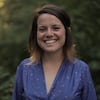Who: Brendan Deiz (guitars, percussion, production), Arlyn Montas (vocals, songwriting).
For fans of: Manu Chao, Los Lobos, Gal Costa.
Sounds like: Dancing to a South American political documentary.
By playing Afro-Latin music in a city like Portland, Brendan Deiz and Arlyn Montas believe they "may be at the forefront of something." In fact, Cilantro, the band they formed after Montas heard Deiz jamming Latin grooves in his L.A. apartment and knocked on his door, transplanted itself specifically to be at that forefront.
Having grown up in Portland surrounded by an overabundance of bluegrass, indie rock and folk rock, Deiz saw an opportunity to stand out by playing "something so different from that Portlandia sound."
Once you get Deiz talking about Caribbean polyrhythms, though, it becomes clear what matters to Cilantro, much more than its competitive edge, is "feeling the music." The live band features up to seven members, with percussion, sax and flute layered atop Montas' earthy vocals. "It just makes you want to move," Deiz says.
"It," in this case, is Cilantro's broad, hybrid definition of Latin music. The band's hip-swinging sound spans Dominican bachata and merengue, Puerto Rican reggaeton, Colombian cumbia and many other styles. While the members are still figuring out which permutations of Latin fusion work best for them, they consider stylistic fluidity the core of their identity.
Cilantro's other defining trait is its lyrical engagement with social and political issues. Deiz describes "Tierra Quemada," a single from the band's forthcoming debut LP, as an enumeration on the idea that "borders don't really exist to anybody except the people being hurt by them." And, in fact, the disintegration of borders is at the root of what Cilantro aims for. "It's a celebration of all this difference—the Afro-Latino diaspora," Deiz says. Revolution is all well and good, he says, but "you've got to be amped up to do it—and having a good soundtrack is important."
SEE IT: Cilantro plays Uno Mas Bar, 1914 W Burnside St., on Saturday, Oct. 1. 5 pm. Free. All ages.
Willamette Week

